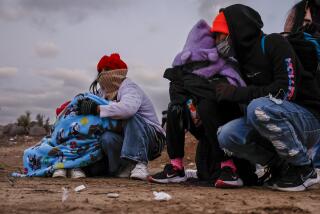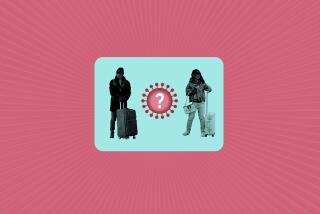Staying Well on Road Takes Some Planning
“No one warned me” is of little help and comfort if you have a health problem overseas.
Staying healthy is up to you. No one does it for you. Neither the travel industry nor the medical profession nor our government has effective systems to alert you to health hazards overseas.
Few foreign countries warn you about hepatitis, malaria, contaminated water and other problems within their borders. Even the immunizations required to enter foreign countries are primarily to protect the citizens of that country from imported diseases, not to protect you from diseases you may contact there.
But the information to stay healthy does exist. Health and safety standards are generally improving, much has been learned about preventing and treating the illnesses commonly associated with travel and, most important, good resources exist to help you avoid problems.
Some Resources
Here are some of the resources that could be very useful:
Guidebooks. Always check “health” in the index of any book you are considering buying. Fortunately many, but not yet all, of the popular travel series now include health.
In-depth discussions about health are especially important if you are planning to visit developing countries. Any travel book about developing countries that doesn’t devote several pages to health precautions fails to give you a complete picture.
Books about travel and health. Each year several books appear about the health aspects of travel. They explain health preparations you need before you leave, jet lag, motion sickness, how to reduce the risk of serious accidents, which illnesses you can treat yourself, how to find competent English-speaking medical help when you need it and numerous other topics.
Recent titles include “Traveling Well” by W. Scott Harkonen MD (Dodd, Mead & Co., New York), $11.95; and “The Traveler’s Medical Manual” by Angelo Scotti MD (Berkeley Books, New York), $4.95.
There are many books for specific destinations and for specific travelers. For example, “The Tropical Traveller” by John Hatt (Pan Books Ltd., London.), $6.95; “Safety and Health Abroad” by John A. Giordano and Mary Shea (Datafax, Minneapolis), $4.95; “Access to the World--A Traveler’s Guide for the Handicapped” by Louise Weiss (Chatham Square Press, New York), $7.95.
These books and others are available from bookstores that have large travel sections, and in many libraries. Several bookstores specialize in books on travel. One of the oldest and the largest is the Forsyth Travel Library, 9154 West 57th St., Shawnee Mission, Kan. 66201, phone (913) 384-3440. You may write or phone for a free catalogue.
Health Associations
National associations. Increasingly, associations that deal with specific health conditions such as diabetes, heart disease, allergies, alcoholism, physical handicaps and hearing problems, for instance, include travel information that is specific. For the name and address of the association you are interested in, check your library.
The Centers for Disease Control (CDC), U.S. Public Health Service, Atlanta, Ga. The CDC compiles the latest information about immunizations and preventive medications for international travel. Their recommendations are the standard for health agencies around the world.
Checking with the CDC is especially important if you plan to visit remote areas of developing countries. In such areas, health conditions change rapidly and books and other sources may be out of date.
You can call the CDC directly in Atlanta at (404) 329-3311, or the nearest office of the U.S. Public Health Service. It has offices in most major cities.
Immunizations Alert, P.O. Box 406, Storrs, Conn. 06268, phone (203) 487-0422. Available are computer printouts of the immunizations, preventive medications and other health information you need for your itinerary. For example, the printout may tell you that the country you plan to visit does not require immunizations if you travel there directly from the United States. But that country may require immunizations if you stop over in certain other countries on your way from the United States.
A printout for itineraries of up to six countries costs $30. Each additional country is $10.
Clinics for Travelers
Travelers’ clinics. In most major cities are physicians who specialize in keeping travelers healthy. A visit to such a clinic is generally useful for three types of travelers: those planning to visit remote areas of Third World countries, those suffering from a chronic illness that could worsen with travel, and those who return home from a Third World country with an illness that their own physician cannot readily diagnose.
Most travelers’ clinics are associated with large medical centers. To find a clinic, contact the largest medical facility in your area.
World status map. This is a monthly publication that lists disease outbreaks, immunization requirements, U.S. State Department travel advisories and local crime problems for every country in the world. Sample copies, $4.95. Yearly subscription, $24. World Status Maps, Box 2533, Fairfax, Va. 22031.
Citizen’s Overseas Emergency Center. A 24-hour telephone number maintained by the State Department to help travelers with health and other problems overseas. The staff can direct you to the nearest U.S. consular office, contact relatives at home in case of emergency, expedite sending private funds overseas, gather and transmit medical information to overseas physicians, arrange for medical evacuation back to the United States and, in case of death, help arrange for the return of remains. The telephone number is (202) 632-5225.
Information Source
The International Assn. For Medical Assistance to Travelers (IAMAT). Up-to-date information is available about the sanitary standards of food and water in thousands of cities and towns around the world. Listed are the places where tap water is unsafe to drink, where salads and dairy products should be avoided and where only meat that is well-cooked should be consumed.
IAMAT also will send upon request a list of countries where malaria precautions are necessary and a booklet of approved English-speaking physicians in most places you are likely to visit.
All information is free, but a $30 donation is suggested. Address: 736 Center St., Lewiston, N.Y. 14092.
“Health Information for International Travel” is an annual soft-cover book issued by the U.S. Public Health Service. It includes complete listings of immunization requirements, preventive medications and other useful health information for all countries. There are maps, charts and tables especially useful before trips to Third World countries. Listings are by country and by disease.
Also included is information about numerous other health subjects. For example: the prevention and treatment of travelers’ diarrhea, advice for pregnant women, how to sterilize water yourself.
The book is available from the Superintendent of Documents, U.S. Government Printing Office, Washington, D.C. 20402. Publication No. 017-023-00173-6. Price, $3.25.
Quarantine Division, Sanitation and Vector Control Activity, U.S. Public Health Service. This agency performs sanitary inspections of all cruise ships that call at U.S. ports. Many well-known ships fail their sanitary inspections. The latest inspection reports are available by writing to the agency at 1015 North American Way, Room 107, Miami, Fla. 33132.
Insurance for Overseas
Travelers’ health and accident insurance. Overseas, your Blue Cross-Blue Shield or major medical insurance will not be accepted by physicians and hospitals (the only exception: the American Hospital in Paris). Your insurance company will reimburse you for your medical expenses, but weeks or months later. That means you will have to pay all expenses at the time they are incurred.
Now available is traveler’s assistance insurance. Such policies offer the following benefits via a 24-hour telephone number to call when you have a health problem: they find an English-speaking physician for you wherever you are; pay your medical bills, including the deposits many hospitals demand before they will admit you; evacuate you to a larger medical facility or to your home if your medical condition demands it; return of remains in case of death.
Insurance companies that offer these services include Access America, 622 3rd Ave., New York 10163; Health Care Abroad, 151 K St. N.W., Washington, D.C. 20005; International SOS Assistance Inc., 1 Neshaminy Interplex, Trevose, Pa. 19047.
Carrying medical records. Several organizations have developed convenient and inexpensive methods to carry your medical records. Such records are generally recognized and readable even by non-English-speaking health personnel. Contact Medic Alert, P.O. Box 1009, Turlock, Calif. 95381; National Safety Council, 444 N. Michigan Ave., Chicago, Ill. 60611.
More to Read
Sign up for The Wild
We’ll help you find the best places to hike, bike and run, as well as the perfect silent spots for meditation and yoga.
You may occasionally receive promotional content from the Los Angeles Times.






